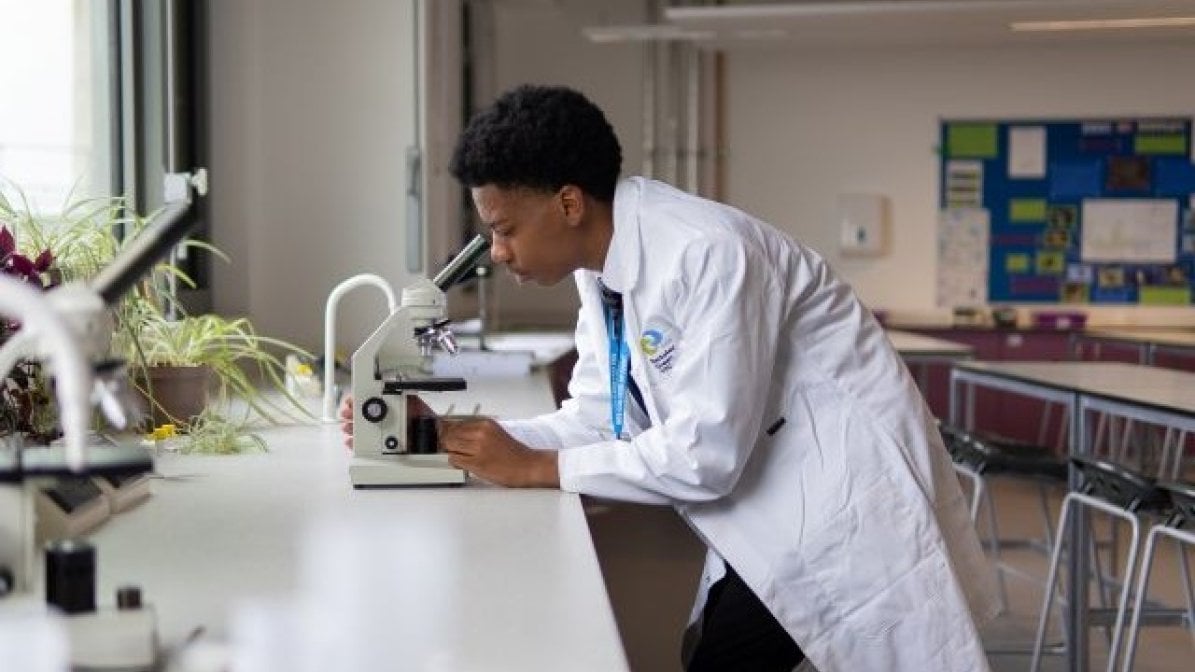An enthusiasm for the subject counts for a lot. We’re always interested to hear what inspires our applicants about their chosen subject, whether it’s a project they are involved in at school, something they pursue as a hobby, or any relevant work experience. We read through every statement we receive and an interesting, thoughtful, personal statement always stands out.
Biology 2026 personal statement guide
Biology admissions tutors say it’s all about genuine passion, enthusiasm, and curiosity. The key to writing a successful biology personal statement is to show you understand what you're applying for, along with some evidence of your enthusiasm, and commitment to the subject.
University of Southampton admissions tutor, Dr Malcom East, outlines two key ingredients he would like to see evidenced in your biology statement:
- You understand something about the course you're applying for, with a realistic perception of what it involves.
- You're enthusiastic about the subject and can show some commitment to it. You can demonstrate this by writing about your wider reading, Extended Project, work experience or any other way you’ve engaged with biology beyond the syllabus.
What do admissions staff at universities and colleges want to see?
Working out what to include in your personal statement can feel daunting, but we’ve got some tips to help get you started.-
1
Think about why you want to study the subject
- Have you been inspired by someone, a news story, a documentary, or a podcast?
- Do you have career aspirations in this area of study?
- What interests you about the subject – be specific; rather than saying you enjoy it or are good at it, try to explain the ‘why’ behind your reasoning.
- What do you already know about the subject and what are you looking forward to learning more about?
-
2
What makes you suitable to study the subject?
- Have you done projects or essays in this subject at school or college?
- Think about who you are as a person; your personality, your strengths, your experiences in life – how do these make you suited to study the subject?
- How have you shown an interest in the subject outside of school or college – have you done extra reading, online courses, been part of clubs or competitions?
- Your current subjects and grades will be included elsewhere in your application, so try to think about specific things you’ve learned during your studies that relate to the subject, rather than listing your grades and subjects.
-
3
Look at the bigger picture
- Have you done any work experience, an internship or had a part-time job in this subject area or related? Most job or work experience will give you transferable skills, even if it’s in a different industry.
- Do you have any hobbies you can mention that might relate to your chosen subject? Many hobbies show that you can be motivated outside of school to achieve and succeed in something you’re interested in.
- Think about how your life and personal experiences have helped make you the person you are today, and how these challenges and experiences can support your application by evidencing essential qualities for certain subjects.
- If you’ve got ambitions and goals for your life and career, can you express how this subject will help you reach these goals?
Guidance and examples you can use
Question 1: Why do you want to study this course or subject?
This is your opportunity to showcase your passion and knowledge of your chosen subject area and to demonstrate to universities and colleges why it’s a good fit for you and your future ambitions.
Examples:
- What topics do you find particularly intriguing? Whether it’s human health or disease, the machinery of the cell or the natural environment, reflect on one or two of these interests in your statement.
- Have you been on an interesting field trip, whether to a zoo, rock pool or museum and what did you take away from it that you want to learn more about?
- Try and get your enthusiasm across. Think about documentaries or YouTube channels you watch that have inspired your passion for biology.
- Think of specific things you like and find interesting about the course you’re applying to, whether it’s field trips, or modules on human biology or infection, immunity and public health.
Question 2: How have your qualifications and studies helped you to prepare for this course or subject?
This is your chance to shout about the relevant or transferable skills you’ve gained from your formal education and highlight your understanding of how they will help you succeed in this subject area.
Examples:
- Explain how preparing for biology exams has given you the relevant time management and critical thinking skills you’ll need on your university course.
- Think about lab work you did at school and what you learned, such as investigating water potential or understanding the effect of environmental variables.
- If you went on a field trip what did you learn from it, including things like collecting samples and conducting observations. How will this help you on your university course?
- Biology students need to have attention to detail, patience, and perseverance – demonstrate how your studies have taught you these skills.
- Have you done any online courses to boost your knowledge in the subject? For example, why not try Subject Spotlights or Virtual Work Experiences from Springpod to grow your skills and interest?
Question 3: What else have you done to prepare outside of education, and why are these experiences useful?
This is your chance to talk about any other activities you have undertaken outside of your formal education, or personal experiences which further demonstrate your suitability for the course. This section is likely to be highly personal to you and anything you do include should reflect on why you’re including it.
Examples:
- Think about anything interesting or unusual you’ve done outside the curriculum, such as volunteering in a lab or working at a garden centre or botanical gardens where you learned about plant biology.
- Mention part-time jobs you’ve had where you picked up skills such as good communication, organisation, teamwork, and even data analysis.
- If you can, reflect on your general reading, debating, contributing to community life, or any cultural or sporting interests, as many universities are keen for you to continue this at uni. However, don’t worry if your home or personal circumstances mean it has been difficult to extend your knowledge or experiences outside of school or college. Universities will usually be sympathetic to this.
- Relate your statement to your career aspirations, whether you want to work in research, healthcare or environmental conservation. Have you done any volunteering or extra research at home that relates to these topics?
Dos
- Do relate any examples back to the subject you’re applying to – make it relevant
- Do make it personal – admissions staff want to get to know who you are
- Do use a spell-checker and grammar-checker to ensure there are no errors
- Do ask people for feedback, whether that’s family members or teachers
- Do your research to find out what universities are looking for, and make sure you include evidence to show how you are suitable for the course
Don'ts
- Don’t just list out examples, subjects you study, or experiences you’ve had without any evidence
- Don’t copy something you’ve seen online or use AI to write something for you
- Don’t make things up just because you think they’ll make you look good on paper
- Don’t leave it until the last minute – you need time for several drafts
- Don’t worry about making each section the same length; as long as you hit the minimum character count, you can use the 4,000 characters across each answer in the way that suits you best
How to set yourself apart
The key to setting yourself apart in your application is to remember how important the ‘personal’ bit is to your personal statement. What makes you, you? Maybe you got a science lab kit as a kid and it sparked your interest, or maybe you had birds or snails on your windowsill or garden that fascinated you. Try and get across your unique passion and interest in biology, and any interesting ways you’ve taken it further.
Talk about any science projects you’ve participated in, whether at school or at home – what sparked your interest? Maybe you’re a twin and fascinated by genetics, or have you always found evolution or ecology exciting thanks to reading about Charles Darwin?
Reference books you’re interested in, such as Dark Matter or The Atlas of Disease, or podcasts you like, such as Radiolab or This Week in Microbiology. Or if you’re interested in the microbiome, have you experimented with fermented foods or tried to change your gut diversity?
Maybe you became interested in science and biology due to personal or family circumstances, like having diabetes and monitoring sugars and its effect on the body. Reference how these experiences have made you think about what you want to learn next, or where you want to take your future career.

How can you demonstrate these skills?
Cardiff University’s admissions tutors want you to demonstrate a commitment, motivation, and determination to further your knowledge in biosciences, along with any experience or other non-academic interests that highlight your personal qualities in general. They also want to see you can communicate this concisely and coherently in your statement,Some more tips to consider
- Written and communication skills: Use your personal statement to show you can write fluently and communicate ideas clearly and with enthusiasm. Have someone else read it through before you send it.
- Analytical thinking: To study biology, you need to demonstrate you can gather information, analyse and break down problems.
- Research the course: Why do you want to study biology, what specific aspects of the course interest you, how does it relate to your academic studies, and what additional reading or other activities have led you to apply?
- Scientific flair: Can you show you’re able to use your initiative? Maybe you started a science club at school, or found a clever way to film night wildlife in your local park?
- Transferable skills: Whether through extracurricular or supercurricular activities, work experience or a part-time job, you’ll have lots of skills that will be relevant to your course. Try to think outside the box – if you’ve learned piano up to Grade 5, can you explain how that has helped with your self-motivation and time management?
FInd out more about biology
